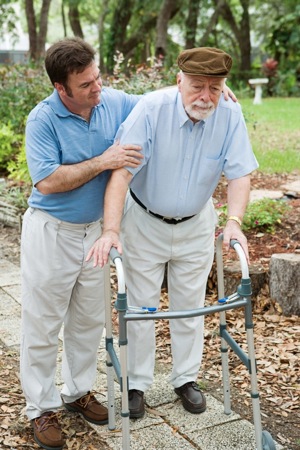
While we focus on cures for disease, patient health, and tools for recovery, one important aspect of health care often goes overlooked: the caregivers. These are the folks who typically manage full-time jobs, a family with children, and household duties while also caring for an ill or disabled spouse or family member, often one with Alzheimer's. Many caregivers work around the clock juggling their responsibilities, typically without help, and must cope with the sorrow and distress of caring for an ill patient. They can never be away long or take time off, they struggle financially, and do not have time for their own health care, hobbies, or social life. With so many people in the caregiver role today, it's important they recognize when their own health is compromised.
Many caregivers die before patient from stress-related illness
The demands of caregiving can be demanding and overwhelming, often putting the caregiver’s own health in jeopardy. In fact, many caregivers die from stress-related disorders before the patient dies. Women, who make up most of caregivers, tend to fare worse than men.
Caregivers are also more likely to suffer from a variety of stress-related disorders. Depression is of particular concern, affecting between 40 to 70 percent of caregivers, particularly those caring for someone with dementia.
Caregivers suffer from increased rates of physical ailments, obesity, serious illness, heart disease, and cancer. The combined effect results in a 60 percent higher mortality rate than their non-caregiving peers. These sobering statistics spring from the effects of unrelenting and severe stress on the body. It's no wonder caregivers are also more likely to contemplate suicide.
Tips for caregivers to preserve health and prevent disease
There are no easy answers to the growing caregiver crisis, however awareness is important. By recognizing the toll caregiving has on health, caregivers are in a better position to get the care they need. Research shows the stress of caregiving can be alleviated by education and support programs. For instance, The Alzheimer's Association offers a guide to local and online support groups, a 24-hour help line, and tips on managing your health.
Although it's difficult for caregivers to squeeze in enough time for their own health, it's imperative to prioritize it. Strategies caregivers can employ to protect their own health and well being include the following:
- Make time to de-stress. There are many methods you can employ for even a few minutes a day to buffer the effects of stress, including meditation, yoga, walking, laughing, etc. It may not feel that rewarding in the moment, but the cumulative effect is significant.
- Find social support. Whether it's a support group or a therapist, regular social support can ward off depression.
- Take advantage of available services. You may be unduly burdening yourself. Some areas have local agencies that can provide relief in the way of meals, adult day care facilities, or home health aides.
- Put yourself first. Caregivers may feel uncomfortable putting their needs first. Ask for help from people in specific ways and understand you deserve to put your health first.
- Walk it out. Regular exercise is one of the greatest ways to unwind and protect your health. If you're too exhausted to work out vigorously, not to worry. Just 20 to 30 minutes of walking most days can still go a long way in terms of prevention and relaxation.



Latest from the Blog
The Dirty Dozen
August 19, 2024The “Dirty Dozen” is a list of fruits and vegetables, compiled by the Environmental Working Group (EWG), that you should always eat organically. These produce items are not only delicious and nutrient-rich but also tend to carry high levels of pesticide residues when grown conventionally. By opting for organic versions, you can significantly reduce your […] Read more
Latest from the Blog
3-Day Detox Plan
Here’s a 3-day detox meal plan tailored to be autoimmune-friendly and compliant with functional medicine principles. This plan emphasizes anti-inflammatory, nutrient-dense foods while avoiding common triggers for autoimmune symptoms. Day 1 Breakfast: Green Smoothie Bowl Ingredients: Spinach, kale, cucumber, green apple, avocado, coconut milk, chia seeds. Why: Spinach and kale are rich in vitamins A, […] Read more